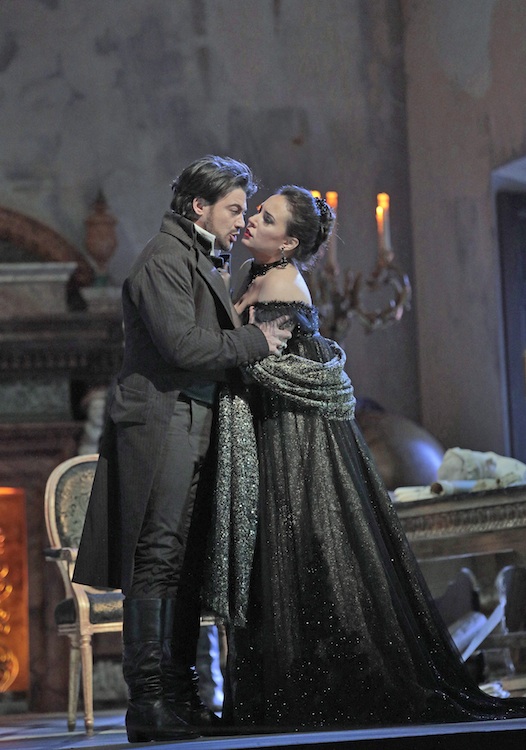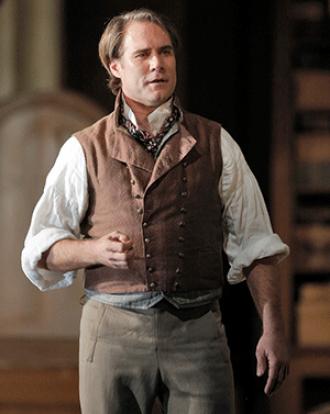|
SATURDEE OPRY LINKS 44:
Somewhat Grigolo/Yoncheva Edition
 
Vittorio Grigolo, Sonya Yoncheva in
"Tosca"
Brandon Jovanovich
Saturdee Opry Links Overture!
"Der Freischutz," by Weber.
https://www.youtube.com/watch?v=rkXK4M7ngBQ
1.
Great opera singers come from warm, supportive families who recognize their
talent early, get them good voice teachers, and offer encouragement,
understanding, and love, no matter how difficult the process. They are
privileged creatures, these artists! Take Brandon Jovanovich, for example. His
father could not have been more exemplary: "My dad was a very violent man,"
Jovanovich remembered. "Eighty percent of him was a horrific human being. Twenty
percent you loved. . .There were times when we thought he would kill us. He was
a drunk---well, not so much drink as drugs. He had stints of selling drugs. .
.Later in life, there was always a con of some sort. He got caught robbing a
silver mine in Nevada and spent a few years in prison for armed robbery. When he
got out, he married some other gal, and they ran a brothel until he died." See
what I mean? Oh, wait. Guess I'm wrong. . .Here is the tenor, one of the most genial in all opera, with "Wintersturme,"
from "Die Walkure," by Wagner. "Winter storm gives way to the merry moon. . ."
https://www.youtube.com/watch?v=huSc0aoHI3g
Setting: the interior of Hunding's house, Germany, mythical times
Synopsis: After Sieglinde offers him escape from her husband Hunding as well as
a sword which is stuck in a tree outside, Siegmund compares his love for
Sieglinde to the beauty of springtime.
Translation:
https://lyricstranslate.com/en/winterst%C3%BCrme-wichen-dem-wonnemond-winter-storms-gave-way-merry-moon.htm
l
2.
Here is why I will never quite fully enjoy a performance by current glam soprano
Anita Hartig:
"As a teenager she wanted to sing Romanian pop music, even though she didn't
have the chest voice for it. A friend encouraged her to listen to opera, "and
I'm like, 'No way!'" Her friend gave her a Maria Callas CD of famous arias, "And
I'm like, 'Oh my god, this is so cool.' I find it very expressive and extreme.
Like, in pop music, you can't be so extreme in expressing your hate or your
love. I was like, 'I have to do this.'" (Screaming now.)Anyhow, here is lovely
Ms. "I'm like" Hartig, in a nice clip backstage at the Met with Vittorio Grigolo,
rehearsing "Mi Chiamano Mimi" from Puccini's "La Boheme."
And I'm like, kind of
horrified. I mean, I'm like. . .I was like. . .How is it that adults who can
sing operatic arias in many languages speak like six-year-olds? (The excerpt above is from Opera News.)
https://www.youtube.com/watch?v=JqEOdBVtGUE
Synopsis : After Rodolfo tells her about his life, he asks Mimi to tell him
something of her. She responds, with one of the most fragile, transporting arias
in all opera.
Translation:
http://www.aria-database.com/translations/boheme2_simi.txt
3.
The hideous---inside and out---Simon Cowell nearly derailed the career of the
guy who is probably the most beloved tenor today (certainly the one with the
most winning stage presence): Vittorio Grigolo. Really. Simon Cowell. That
chisel-haired biceps-flaunting aresehole who hosts that horrid "Britain's Got
Talent" thing. Cowell (famously) heard tell of the handsome, effervescent young
Italian tenor, and flew him to London in order to make a pop star out of him
(!). Grigolo remembered:
“They wanted a good singer, good looking, the right product,” he said. “They
thought this was me. But we never really started, because I changed my mind. I
was with them two, three months. We did some recordings together but they
weren’t released, and I signed no contracts. It was just a trial. I got worried
that if I make this commitment, it means leaving opera and never getting back. I
think I lost a lot of money. But I gained a lot of respect. This is something
you can’t buy.”
Smart guy, Grigolo. Tough to walk away from sure-fire fame and fortune. Ask
Mario Lanza. Oh, wait, you can't---he died young from the trappings of. . .fame
and fortune and "going Hollywood."
Here is a wonderful example of Grigolo's somewhat baritoney tenor, here singing
Edgardo's aria from Act 3 of "Lucia di Lammermoor" by Donizetti.
Setting: The Ravenswood cemetary
Synopsis: Edgardo sings of his wish to die in the upcoming duel with Enrico for
he cannot stand to live while Lucia delights in the pleasures of another
husband.
https://www.youtube.com/watch?v=f_G1nWIQNh4
Translation: (search for "Tombe")
http://www.murashev.com/opera/Lucia_di_Lammermoor_libretto_English_Italian101
EXTRA:
Parroting Opera:
https://www.youtube.com/watch?v=sfT_SuDRLNE
4.
In the last act of "Andrea Chenier," by Giordano, the poet, Chenier, has been
condemned to death by the revolutionary tribunal. While awaiting execution in
the Saint-Lazare prison, he (surprise) writes a poem. The aria, "Come un bel di
di maggio," builds to a rousing verismo climax. Critic Mary Jane Matz once wrote
of it, "It is a gem of lyricism, gruelling to the singer despite its apparent
simplicity. It calls for feather-light singing between the taxing dramatic music
of the third and fourth acts." Okay, never say that Saturdee Opry Links is
without hifalutin' analysis, even if this was stolen from Opera News. Here is
Placido Domingo at his very best, with the aria, a-wayyy back in 1981.
https://www.youtube.com/watch?v=o7inOr_gnig
Translation:
http://www.aria-database.com/search.php?individualAria=52
5.
Ever throw a party and have some uninvited rabble appear, get drunk, and throw
up on the walls? This is perhaps how the royalty felt, more or less, when the
poet, Andrea Chenier, appeared at a ball for Palace of the Countess of Coigny.
The countess, at one point, asks the quaint poet to improvise a poem to delight
and amuse the gilded throng. Chenier defers, saying inspiration has abandoned
him. Maddelena asks Chénier to recite a verse, but he refuses her also, saying,
"Fantasy is not commanded on cue." The laughter of girls draws the Countess'
attention, and Maddelena explains mockingly that the muse of poetry is absent
from the party. Chénier becomes angry and throws up on the walls, I mean,
improvises a poem about the suffering of the poor, ending with a tirade against
those in power in church and state, shocking the guests. My kind of poet. Here
is that scene, with Placido Dominigo as Chenier. "Love is a gift divine / do not
despise it." This is "Un di all'azzurro spazio."
https://www.youtube.com/watch?v=768714I-f70
Translation:
http://www.aria-database.com/translations/chenier03_un.txt
6.
Of course, the fairy tale I sketched in the first post today does come true for
some. That is, the supportive family and teacher leading to great success. Or in
the case of Sonya Yoncheva, one of the splendid sopranos today, a "lion mother."
As she remembered: “I have a very strong mother, as we call it in Bulgaria, a
‘lion mother. When I was born, she decided for me that I would be an artist.”
Yoncheva studied as a pianist from the age of six until her early teens, when,
in the course of hosting a music show in her hometown, she discovered that she
could sing. “One of the rehearsals was with a lady that came and opened her
mouth and she started to sing a Mozart aria. I was so much impressed by that
sound, I wanted absolutely to imitate the same.” After hearing her daughter’s
first attempts, Yoncheva remembers, her mother said, “You will be an opera
singer.” Yoncheva was enrolled in singing lessons the following day. And the
rest is. . .
Watch and listen to how Yoncheva seems to spontaneously express "Vissi d'arte,"
from Puccini's "Tosca." She is not "singing a great aria"---she seems more to be
thinking and emoting in the moment. It's pretty masterful, and far more
affecting than mere beautiful work. Callas did this, of course.
Synopsis: Tosca has just agreed to allow Scarpia to have his way with her, in
exchange for sparing the life of Cavaradossi. She muses on her terrible fate.
https://www.youtube.com/watch?v=bLc6nfvgN8A
Translation:
http://www.aria-database.com/search.php?individualAria=302
Here, for comparison, is wonderful Sondra Radvanovksy, who carefully crafts and
couches the aria. Which do you prefer?
https://www.youtube.com/watch?v=3pryZos2oOk
7.
Speaking of emoting "in the moment," as opposed to singing and acting (see
Yoncheva post), here is an example, using yet another warhorse aria, of why
Vittorio Grigolo is so loved. Even the greatest singers will, quite
understandably, often be more concerned with execution of song than acting.
Grigolo, a real live wire, fairly bursting with life, draws on these innate
qualities while on stage. Here he is with a wrenching "E Lucevan le Stelle"
("And the stars were shining") from Puccini's "Tosca."
https://www.youtube.com/watch?v=EjPvj-1WHIc
Setting: The ramparts of a fortress
Synopsis: It is the night before Cavaradossi's execution. He trades his last
possession, a ring, to get a guard to take a letter to the imprisoned Tosca. As
he writes the letter, he sings of his love for Tosca and for life.
Translation:
http://www.aria-database.com/search.php?individualAria=305
Compare with Domingo. Which do you prefer?
https://www.youtube.com/watch?v=hxdiJ74AL5Y
8.
Love the fact that the despicable character in an opera would be named "Wurm."
("Worm" in German.) Here is Sonya Yoncheva with the aria, "I may be punished,"
from Verdi's "Luisa Miller" (this week's Met opera.) Yet again, she seems to
exist in the moment. One is not aware of "singing and acting." With English
subtitles.
Setting: a room in Miller's cottage, the Tyrol, early 17th century
Synopsis: The father of the peasant girl, Luisa Miller, has been taken to jail
and is threatened with execution because Luisa and Rodolfo, the Count's son, are
in love. Wurm, the Count's secretary, tells Luisa the only way to save her
father is to write a letter saying that she loves Wurm and that she never loved
Rodolfo. She writes it and then sings that, if she does wrong in writing this
letter, she wishes God to punish her instead of Wurm and the Count.
https://www.youtube.com/watch?v=J8pCR5ydsWE
Nice backstage interview with Sonya.
https://www.youtube.com/watch?v=3NrCpNLpQF8
9.
Okay, I'm like, wow, you know? I'm like, posting Saturdee Opry Links, and. .
.I'm like, I said bad things about Anita Hartig, dude. Just because she's like,
"I'm like. . ." all the time, you know? Gah. So I'm like, I gotta make up for
that. I mean, she's like, Romanian, dude! Valley is, like, her second language.
So cool. So here it is: Anita Hartig singing the poignant "Je dis que rien ne
m'epouvante" from "Carmen" by Bizet, in which she calls for God to help her. She
has a rather winning, tight vibrato, don't you think?
https://www.youtube.com/watch?v=gDhxfLiADUE
Setting: A mountain pass
Synopsis: Searching for Don José, who she still loves in spite of the smugglers,
Micaëla finds herself alone in the mountains. Frightened, she prays for courage.
Translation:
http://www.aria-database.com/search.php?individualAria=41
Just for comparison. Yoncheva has a fuller, richer, more mezzo voice:
https://www.youtube.com/watch?v=KO7vJ_3KRNU
FINAL BOW:
Here are the great singing actors, or great acting singers, Vittorio Grigolo and
Sonya Yoncheva, with "Parigi, O Cara," from "La Traviata," by Verdi.
Synopsis: Although Alfredo and Violetta both know that she is dying, they sing
of her getting well and how they will leave Paris to start a new life.
https://www.youtube.com/watch?v=ocLfpibNbCw
Translation:
http://www.opera-arias.com/verdi/la-traviata/parigi-o-cara-noi-lasceremo/
Saturdee Opry Links Encore!
"What a wonderful thing is a sunny day." Vittorio Grigolo does the honors.
https://www.youtube.com/watch?v=U4jh_nYXpww
Translation:
https://en.wikipedia.org/wiki/%E2%80%99O_sole_mio
Back to Opera Links
Back to Home Page
|



